By Roxana Hadadi | TV | January 14, 2019
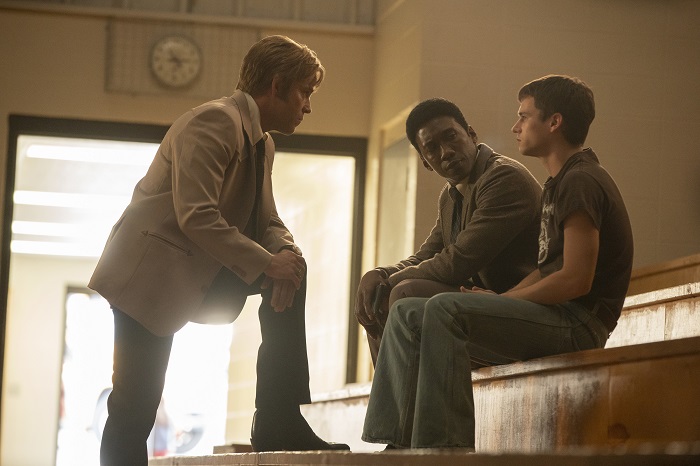
“Of course I remember. I remember everything.”
More than two and a half years after True Detective season two caused us to collectively recoil from our TVs and go, “Oh, oh no, no thank you,” season three is here! And, well, it looks a hell of a lot like season one—but with the excellence of Mahershala Ali, the unexpected steadiness of Stephen Dorff, and that excessive bleakness that creator and writer Nic Pizzolatto has made his trade.
I adored True Detective season one, and I’ve seen the first five episodes of this third season. I’ll be handling your recaps through February 24, when the season will wrap with the episode “Now Am Found.” Last night’s premiere was a double-header, with first episode “The Great War and Modern Memory” and second episode “Kiss Tomorrow Goodbye.” There are overlaps with season one—another case involving missing children, another time period that felt consumed by satanic panic, another pair of disgruntled cops in unhappy marriages—and yup, some of Pizzolatto’s trademarks are here, too.
Men traumatized by war! Men who prefer to go rogue rather than follow the rules! Men whose first answer to a problem is violence! I can understand that some viewers will shrug this all off as braggadocio, bombastic bullshit, and I won’t deny that season two makes me think some of the best elements of season one came from director Cary Fukunaga, not necessarily Pizzolatto. But the ambiance for season three is right so far—the murkiness, the melancholy—and director Jeremy Saulnier (of Hold the Dark, Green Room, and Blue Ruin) adds a sort of understated spookiness to all this. (Saulnier was supposed to direct the entire season, a la Fukunaga, but then bounced after the first two episodes because I’m assuming some crap went down behind the scenes; I remain pretty salty.)
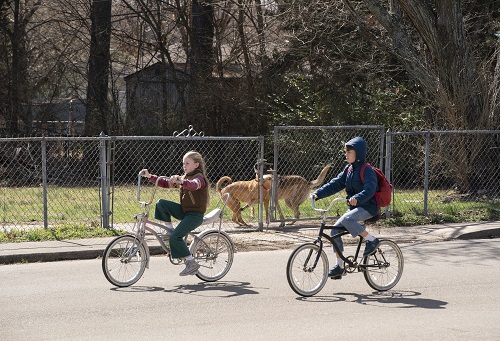
“The Great War and Modern Memory” jumps between three timelines (1980, 1990, and 2015) to explore the central mystery of this season: What happened to the Purcell children? 12-year-old Will and 10-year-old Julie from West Finger, Arkansas, got on their bikes at 4 p.m. one evening, told their father Tom (Scoot McNairy, with a mustache that practically screams, “I am overcome by tragedy”) they were going to see a classmate with a new dog, and were told to be home by 5:30 p.m.
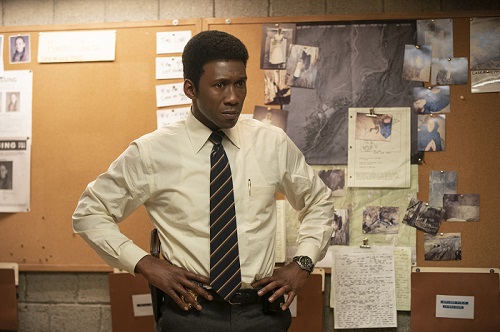
But hours pass, and the children don’t come home, and so partners Wayne Hays (Ali) and Roland West (Dorff) catch the case, arriving at 5009 Shoepick Lane to try and sort out what happened and where the children could be. Hays takes control of the situation immediately, and as West says more than once, his fellow detective is a tracker. He did long-range reconnaissance during multiple tours in Vietnam, he wandered through jungles on his own and came out with evidence of the men he had killed, he can pick up a trail with only a single footprint on a muddy path. And it’s clear that while Hays is tremendously skilled, the color of his skin keeps him an outsider among fellow police (who do some grumbling when Hays directs them to start searching for the Purcell children at nearly 11 p.m., followed up with his admonishment of West, “They ain’t my tribe, man. Take care of your shit”) and even to the frantic Tom, who practically sneers at Hays when he promises to find the man’s children. Consider how Hays asks Will’s English teacher, Amelia (Carmen Ejogo), “How is it here? … You know,” and his combative attitude when the story jumps forward to 1990, when we learn that the case from 1980 is being reopened. “I’m pretty easygoing, but go away already,” Hays says to the attorney who is leading the deposition and questioning what Hays does or doesn’t remember. He’s flippant in a way that he wasn’t 10 years ago and unsettled in a way that he wasn’t 10 years ago, when he and West were searching for answers.
Who could have done this crime? We don’t get any clues from the 1990 version of Hays (although he’s being deposed, and there’s some allusion to the “family” wanting to overturn the conviction, no one is named) or the 2015 version of Hays, who is being interviewed for a true-crime documentary about the case (Pizzolatto, getting meta) and who is having issues with his memory. He records notes to himself to listen to the next day; he asks his adult son Henry (Ray Fisher! Cyborg!) twice in a row why his daughter Rebecca hasn’t come around anymore. “I never stopped coming up with theories about that case,” Hays says, but how many of them can he remember?
Back in 1980, there are a variety of suspects I’m sure we’ll be tracking over subsequent episodes: three teenage boys who pass the children in a purple Beetle on the way to a park nicknamed “Devil’s Den,” where they drink, listen to metal, and set off fireworks; a local man, Brett Woodard (Michael Greyeyes, of Woman Walks Ahead), who goes around town collecting trash to sell, passes them in his truck; and then there are Tom and his wife Lucy (Mamie Gummer), who can barely tolerate each other, and Lucy’s cousin Dan (Michael Graziadei, of The Young and the Restless!), who was staying with the family and who might be responsible for the porn magazines the detectives find under Will’s mattress—and maybe for the peephole they find drilled into Will’s closet, one that looks into Julie’s room?
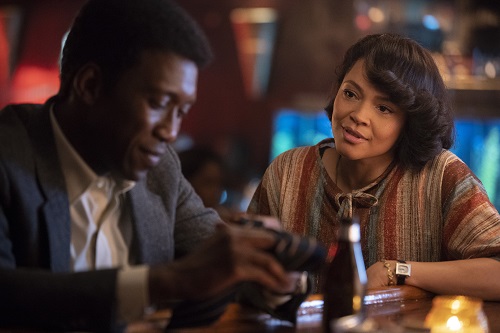
There are all sorts of open threads tossed out in these first two episodes, some of which will undoubtedly be red herrings and some of which I’m curious about: that peephole, of course, but also the sex offender Hays and West beat up; how the prosecutors seemed to be working against Hays and West, not helping them; who sent the note the family receives, at the end of the second episode, that says “children shud laugh”; and Amelia’s skills as an investigator and an interviewer, and how her work on the book about the case, Life and Death and the Harvest Moon—which Hays in 2015 admits he never read fully—may have interrupted or advanced the detectives’ work. Why was Will found with his hands lifted as in prayer? Is there a religious element here? What is up with those damn cornhusk dolls? Are they as spooky as the devil’s nests from the first season (I say yes)? Is Julie really alive, and if so, how? Why? Was she really Tom’s daughter? Does that matter? And how much more will the shadow of Vietnam linger upon these men, upon their fears and their failures?
There’s a lot, a lot, going on here, and most of it is successful because of Ali, who nails this different character not only in three time periods but in three distinct areas of his life: going from a man who swears to his partner that he’s never getting married (“I’m not a big enough asshole to put a woman and children through that”) to someone who feels stifled by the consistency and familiarity that family brings (yes, that is classic Pizzolatto) to someone who now yearns for time past, who misses his dead wife desperately, who is trying extremely hard to hold onto this case so that he doesn’t disintegrate further. Ali is such an even-keeled performer, often so soft-spoken and so quietly domineering, that he inspires fear even when making the most clichéd threats (“You will bleed black cock,” for example, when confronting the pedophile he and West think may be a suspect) and yet can offer sympathy and warmth, too. His conversation with Woodard about Vietnam is nuanced, and yet as he lets slip to the lawyer doing the 1990 deposition, “You know what happened with him”—something terrible, I expect. This is True Detective, after all.
Some odds and ends:
+ I appreciate that Hays didn’t let West shoot the fox, and also liked the follow-up that Hays does hunt boar on his own for fun. That’s a character tidbit that makes complete sense for Hays having grown up in the Ozarks, and feeds into what he tells Amelia later—that he had a rural upbringing because of his mother, that he identifies as a Republican, and that he’s fundamentally quite conservative.
+ “Steve McQueen died today”—a shared memory among so many of the men in the show.
+ Saulnier isn’t a particularly flashy director, but I loved the sense of foreboding he built among this dreary, drab Arkansas town, where everything is either brown or grey: The shadowy darkness waiting at the end of Shoepick Lane, the opacity that Tom can’t see past when he’s waiting for his children to come home, and the futility of those searchers’ flashlights trying to pierce the misty fog of the field they were looking through, and the reflection of the full moon in the puddle of water where Hays sees a footprint. Some beautifully ominous imagery that adds to the show’s sense of place without being too ostentatious. I’ll miss what Saulnier could have done with the rest of this season.
+ Great line: “General rule is everybody’s lying, period.” Another great line: “I miss when ‘Don’t get killed’ was the only thing on my to-do list.” And finally, Ali’s delivery of “This is what people do now?” when the true crime producer shows him websites devoted to exploring old mysteries was pitch-perfect.
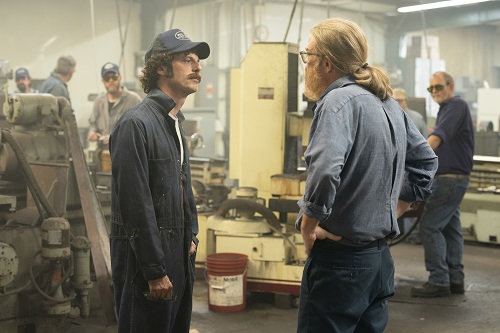
+ Please give Scoot an award for “I’ve been working full time since I was 14 years old. You want me to sit at home with this shit in my head now? … I’m the guy nobody wants to be”; that whole thing broke my heart. And then he broke it AGAIN with “If we’re not gonna find her, I just need to know now.”
+ Theme song this season: “Death Letter” by Cassandra Wilson.
+ Lindsey Romain over at Nerdist breaks down how the case of the West Memphis Three overlaps with this season.
+ Former Overlord Joanna Robinson writes in Vanity Fair about the literary references in these first two episodes, from the poems Amelia reads her class to the Dungeons and Dragons-style guide that we see in Will’s room.
See you next week, when we recap episode three, “The Big Never.”